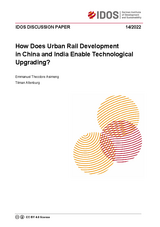How does urban rail development in China and India enable technological upgrading?
Asimeng, Emmanuel Theodore / Tilman AltenburgDiscussion Paper (14/2022)
Bonn: German Institute of Development and Sustainability (IDOS)
ISBN: 978-3-96021-194-5
DOI: https://doi.org/10.23661/idp14.2022
Preis: 6 €
The socioeconomic wellbeing of urban areas depends on a well-functioning transportation system that makes it easier for people to access goods and services. Whereas most urban areas in emerging economies are expanding in size and human population, high motorisation and inadequate public transport services have resulted in congestion, traffic accidents and increasing transport-related greenhouse gas (GHG) emissions. Urban rail development can help address the current transportation problem because trains can move a large number of people at high speed, provide reliable services, contribute to lower GHGs and have a low accident rate. However, urban rail is expensive and requires many technical and technological capabilities often unavailable in emerging economies because they are technology latecomers. This paper examines how two emerging economies, China and India, have adopted industrial policies to develop local capabilities for urban rail technology. The paper shows how the Chinese government has moved from purchasing urban rail technology from multinational companies (MNCs) to the current situation where it has developed local capabilities, owns rail technology patents and competes with the same MNCs on the international market. The paper also demonstrates how India is gradually improving the local manufacturing of rail subsystems as opposed to importation. Overall, the paper suggests a pathway to industrial policy adoption that demonstrates how emerging economies can catch up with urban rail technology development to address their local transportation needs.



